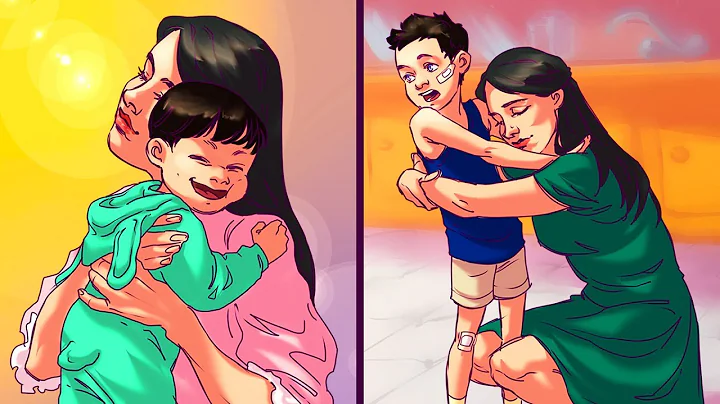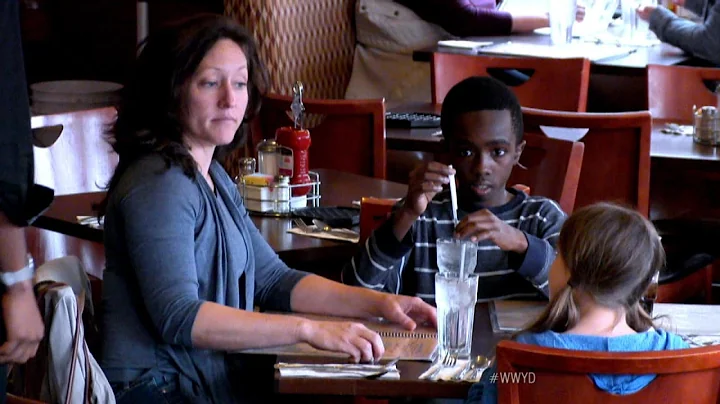A parenting TV series that has become particularly popular recently is "Come on!" "Mom", in which Wu Yue plays lawyer Su Qing. Her eldest son Xiaofu grew up in a repressed and unrecognized environment, so he became very self-conscious when he reached the rebellious stage.
His mother, Su Qing, has held strict standards for him since he was a child. In addition to school classes and homework, there are also extra cram schools and homework. These occupied the eldest son's entire childhood, leaving him with no time to hand in homework. My friend, the whole person has become very depressed.
In order to get his mother's attention and approval, he deliberately did some outrageous things and made mistakes deliberately to attract her attention.
But he was disappointed every time. The more he tried to get his mother's attention and approval, the more easily he got hurt and the more he was scolded.
Therefore, if he doesn’t get attention from his mother, he will find a sense of existence by himself, and put what he is missing in his heart into photography. Whenever he has time, he will take a camera to shoot the sky. Only in this way can he feel a little bit safe in his heart. feel.
Children who have been ignored, not recognized, and constantly denied since childhood will deliberately seek a sense of existence from others.
The author of the book "Our Inner Defense: Coping with Daily Psychological Injuries" is a consultant and columnist, Ren Li. She extracted some more representative defense mechanisms from the book, supplemented by vivid daily situations. , cases and some movie plots, interpreting the problems caused by various defenses and their resolution methods.

Let’s take a look at how to deal with some of the more common defensive psychology.
Denial
Denial means that we turn a blind eye to events that occur objectively, including both the conscious and subconscious levels.
No matter what happens, as long as it is something you cannot accept for a while, your inner drama will come out, and you will go through these five stages: denial, anger, bargaining, depression and acceptance.
For example, the college entrance examination results are out, but your score is very unsatisfactory. When you see the score, you can't believe it.
At this time, your first reaction is to deny, "How is it possible? My usual scores are more than these, why did I do so poorly this time?"
Start to find reasons for your unsatisfactory test results, but the reality is like this, Didn't do well in the exam. But you still can't accept it, and ask yourself again, "Why me?" For a while, you can't accept it, and you can only blame everything and others, and complain that God is unfair.
But in the face of unchangeable facts, sadness, disappointment, sadness, after that, you can only choose to accept it.
So, when external conflicts or internal conflicts arise, how should we deal with them?
First, ask yourself: "Is the truth really what I see?"
Second, notice when you often say "no."
Finally, when we encounter someone who is accustomed to "denial", we can choose to try to understand him.
Compulsive Repetition
Compulsive Repetition is a psychological phenomenon proposed by Freud. It refers to an individual who compulsively, stubbornly, and constantly repeats certain seemingly meaningless activities or traumatic events or situation.
involves constantly re-creating similar events subconsciously, repeatedly putting yourself in situations where similar trauma is likely to happen again, and allowing yourself to constantly relive certain painful experiences.
For example, domestic violence.
Children who grow up in a bad environment of domestic violence will have an 80% chance of hitting their significant other, especially boys, when they grow up.
For a girl, she will long for herself not to be domestically abused again, but it often backfires. The more she hopes that something does not exist, the more it will appear, and it may be more serious than what she experienced as a child.
People who have been subjected to domestic violence since childhood cannot get out of the quagmire and have been trapped here. As long as they are stimulated by words, they will explode immediately.
So, why is it said that children who have been domestically abused since childhood have a high probability of beating their partners or children when they grow up.
So, how to break this curse and stop the compulsive repetition of trauma?
1. Return to the here and now
Compulsive repetition always points to the past, making it impossible to return to the present. But we can make ourselves surrender to the present moment and focus on the present moment through deliberate practice.
When situations that make us feel hurt appear, we can choose to bring ourselves back to reality, live in the moment, feel it, and face it.
Don't be disturbed by those traumatic situations and be your own master.
2. Establish a trusting relationship
The best way to repair past trauma is to learn to establish a safe and trusting connection with others, because only in this way can the compulsive repetition be ended.
can experience being respected, cared for, valued, understood, and seen in a good interpersonal relationship (for example, a couple, a friend, a teacher-student relationship), thereby improving self-esteem.
Then, you will have a new understanding of yourself, and the way you treat others will also change.
3. Join a supportive group.
When you feel frustrated, you can also get support, understanding and encouragement from the group, and you can continue to try bravely.
For example, education and training is an industry that can heal people.
It can not only heal you, but also improve your cognition.
Because here, there will be a group of positive and energetic partners working hard with you, and they will give you full mental encouragement and support.
Even if you do not do well in some aspects sometimes, they will not blame you, but choose to understand you and be considerate of you.
So, in this industry, you can regain your confidence, get rid of compulsive repetition, and get rid of childhood trauma.
Belittle
Improve yourself and establish your own authority by belittling others.
In an intimate relationship, they will achieve their goals by belittling their partner, saying that the other person is worthless, pushing all the faults onto the other person, making the other person feel guilty and doubt themselves, and then show that they can do everything. , whatever you do is right, and whatever you do is done right.
In the process of educating children, they will show off how awesome their childhood was, or compare their children with other people's children to belittle the child's IQ, and then scold the child for being so stupid and useless. But in fact, they are doing this to maintain their dignity and cover up their incompetence.
People who like to belittle others to establish their own authority have these characteristics:
Exaggerated self, idealized self, twin self
There is a high probability that they were not well reflected in their early growth. , have not been truly seen, so they prove their existence and value by belittling others, which becomes a way for them to hide their inner vulnerability.
So, how should we deal with such people?
ignore him and focus on improving yourself. If you can stay away, stay away from him as much as possible and don't have too much contact with him. If you can change to a better environment, that would be great, but the premise is that you must be good enough and capable to have the capital to choose.
Suppression
People habitually suppress their feelings and thoughts and curb their inner desires to avoid disappointment.
For example, a person is particularly afraid of going to a crowded snack street. Once he is in such a place, he will feel uncomfortable all over and will be so nervous that his palms become sweaty and he has difficulty breathing. This feeling is preserved, but his thoughts are not. there is none left.
And he suppressed his feelings, did not observe it or feel it, so he became inexplicably nervous whenever he encountered a crowded place, instead of finding ways to avoid it.
So when such a situation occurs, what should you do to release your feelings and thoughts?
Allow yourself, let yourself go, and accept your imperfections.
If you are afraid of crowded places, then you won’t go there. You don’t have to go to that kind of place. You can choose an environment that makes you feel comfortable to release yourself.
It doesn’t matter if you are different from others. After all, no one is perfect. To accept your imperfections is to choose to reconcile with yourself.
At the same time, if a certain person or a certain situation makes you unconsciously suppress your feelings or thoughts, you can choose to change the environment, change the perspective, and change the relationship.
If the environment is unfavorable to your development, you can choose to change to an environment that makes you feel comfortable; if you cannot change, then choose to change your mentality and look at the matter from another perspective. Naturally, the relationships around you will also change accordingly.
Identity
In order to establish a relationship with the other person, we often desire the approval of others, or we choose to identify with the other person, thereby drawing closer to each other.
The purpose behind identification is to satisfy the sense of belonging. Whether it is identifying with others or being recognized by others, it is preparation for integrating into the group and establishing a sense of connection with others.
For example, when you are in a strange environment, in order to adapt to it quickly, you will choose to take the initiative to say hello to others.
often uses "Where are you from?" as a breakthrough point, just to make the other party put down their guard and establish a relationship with themselves.
and then gain recognition from others.
Passive
A passive personality will choose to evade responsibility and is unwilling to be responsible for others.
They will have these 7 traits:
Unwilling to make decisions, often handing over decision-making power to time or others
Too picky, never sure of others
Cold violence, cold treatment, not expressing emotions
Procrastination
Controlling
Passive Attack
do not make promises easily, or make promises but often break them
They are accustomed to leaving the decision-making power to time or others. They have almost no independent opinions. What others say is what they say, but they never affirm others and never express it. His own attitude kept delaying.
So, if you have these qualities, what should you do?
Manage your time well and know how to plan for the future.
You can set a small goal for yourself, leave enough time to complete it, and put this matter first. If you fail to complete it, give yourself corresponding punishment.
I am @向林, I will accompany you to grow up throughout your life





















